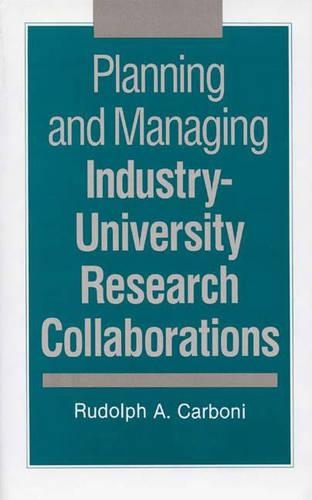
Planning and Managing Industry-University Research Collaborations
(Hardback)
Publishing Details
Planning and Managing Industry-University Research Collaborations
By (Author) Rudolph A. Carboni
Bloomsbury Publishing PLC
Praeger Publishers Inc
26th October 1992
United States
Classifications
Tertiary Education
Non Fiction
Higher education, tertiary education
Science funding and policy
Scientific research
Industry and industrial studies
Technology: general issues
378.013
Physical Properties
Hardback
240
Description
Mounting global competition, rapid technological change, and skyrocketing research costs are changing the arm's-length relationships between industry and universities toward closer and more direct co-operation. Yet, many companies remain unsure about how to proceed in establishing effective alliances with the "right" universities and faculty investigators. Many books and articles describe features and benefits of the diverse forms of co-operation between two communities, usually from the academic viewpoint. Based on his experiences in directing many (successful) collaborations between Du Pont and research universities, Carboni offers fresh insights and practial guidelines for planning, organising and conducting effective bilateral research initiatives, from the corporate perspective. Strategies and techniques are outlined, which should enable managers and technical professionals to deal with major issues and problems throughout every phase of the undertaking. An historical analysis is intended to help the reader to understand the forces and events that have shaped the changing relationships between industry, academia and government since World War II. The advantages and pitfalls of major types of industry-university research interactions are described so that the reader may evaluate and choose the "best" options for his or her company's needs and circumstances. The reader is also shown how to analyse the key technical issues and gaps of his or her company as a basis for selecting a balanced portfolio of university projects. Factors to be considered in choosing suitable faculty investigators are discussed. For less experienced managers, the book offers suggestions for obtaining executive and in-house support, negotiating research agreements, and evaluating and transferring key scientific and technological findings to the organisation for exploitation. This book is intended to be a valuable desk-side resource for corporate executives and technical staff who seek fresh insights and information concerning the role, conduct and potential impact of university collaborations on the company missions. The treatise enables academic and government scientists, research administrators and consultants to acquire a deeper understanding of corporate needs, values and expectations from these alliances.
Reviews
The book provides eminently useful testimony and sound advice.-Change
"The book provides eminently useful testimony and sound advice."-Change
Author Bio
RUDOLPH A. CARBONI is now retired from E. I. Du Pont de Nemours Company where he held a number of technical management positions, including academic projects director. He is published widely in journals such as the Journal of the American Chemical Society, and in electronics society, and trade journals. He holds 20 patents and has lectured at universities, and scientific and technology conferences in the United States and abroad.
